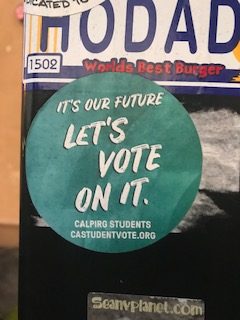Shown below is a CALPIRG sticker encouraging students to vote for their cause. Exercising our right to vote has been a hot topic lately with the primary elections coming up. Throughout the course of US history, suffrage has evolved from being limited to white males over the age of 21 to including any US citizen over the age of 18. This right stems from the definition of democracy: a government ruled by the people. The Declaration of the Rights of Man and Citizen states that “[l]aw is the expression of the general will. Every citizen has a right to participate personally, or through his representative, in its foundation.” In other words, every citizen can be involved in the discussion and creation of laws. This notion is derived from Rousseau’s social contract theory where people enter a social contract by willingly submitting to the general will of society and execute this general will by participating in government matters. Voting is one way to contribute to shaping a government that meets the people’s expectations. However, this begs the question of whether the people are the best judges of the change they want to see in society and how to go about bringing that change. Without considering the amount of time needed to count the votes, would it be better to let the government’s decisions be decided on the direct vote of citizens or the vote of an educated and elected few?

